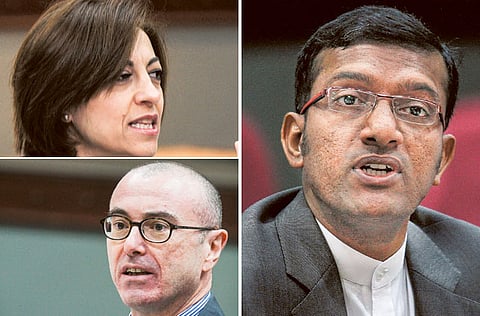Conference explores views of expats about UAE society
Foreigners generally see the UAE as second home despite mix of 200 nationalities

Dubai: A one-day conference to explore how expats view UAE society was held in Dubai on Monday, with foreigners from Arab, Asian and Western backgrounds saying they generally regard the UAE as a second home despite the presence of some 200 nationalities here.
The event, titled The UAE Through its Expats’ Eyes, was organised by the Dubai Cultural and Scientific Association (CSA) and Zayed University (ZU).
Foreigners’ perceptions about the UAE carry weight not least because an estimated 80 per cent of the 8,000,000-strong UAE population are expats, the conference heard.
CSA Chairman Sultan Saqr Al Suwaidi said this ratio and relationship between UAE nationals and expats was “unique” and described the situation as a “sublime cultural endeavour”.
“We want to develop this and work hand in hand with [expats]. Listening to them is crucial and their point of view is very important. That could lead to prosperity of the UAE,” Al Suwaidi said.
Conference speaker Dr Afaf Bataineh, a British national of Arab origin who is a professor at ZU, said there appear to be three broad views of the UAE lifestyle among Arab residents.
“The conservative or extremist views that feel ‘concerned’ about the UAE model and what it should be. This segment is very small. They want to ‘protect’ themselves from ‘losing’ their identity and have their own concept of what an Arab-Muslim country ought to be,” Dr Bataineh said.
She described the second category as “open to other cultures and modern”. The third segment is Westernised who believe their identity is “variable rather than stable”.
“My main concern as a representative of the Arab community is the domination of English over Arabic despite Arabic as the official language. But English dominates the economy in the UAE,” she added.
Meanwhile, the Asian perspective was discussed by Dr N. Janardhan, a political analyst from India, He also touched upon anecdotes of second generation Asians who were born and raised in the UAE.
“My friend who is a second generation Indian in the UAE said I’m Indian head to toe but a Dubai-ite at heart… My nine-year-old son is familiar with the adhan (Muslim prayer call), some verses of the Quran and some Arabic,” Dr Janardhan said.
He added there was an increasing feeling among Asians here that “home is where the job is, not just where the heart is”.
However, as their stay here is usually limited to their work contract, they also live in a “permanent state of impermanence”.
The conference also heard about issues and experiences of the British community in the UAE, narrated by Francis Matthew, Editor At Large, Gulf News. “The British community in the UAE is a much larger group then it used to be and also quite diverse. It’s not one single coherent group,” Matthew said.
He noted that bilateral trade and investment was burgeoning under the government and business leadership of both countries.
“Why are many of the British community here? We like it: No taxes, it’s safe, good schools and people see it as a base to build a career. Frankly speaking we’re not thinking too much about the UAE model – we’re just enjoying living it,” Matthew said.
He added that contrary to some media reports in the UK, British expats in the UAE feel “relaxed and not concerned about the UAE legal environment”.
Meanwhile, the US expat experience was narrated by Dr Stephen Gardner, a professor at ZU. He said that many perceptions about the Middle East were shaped by US media and foreign policy, many of which he did not agree with.
“I had to convince my in-laws to visit the UAE. Now, they ask me ‘why would you ever want to move back?’” Dr Gardner said.
“The UAE has invested in the public good, you feel your life is comfortable here. There’s this sense of security and stability we didn’t find in the US sometimes.”


